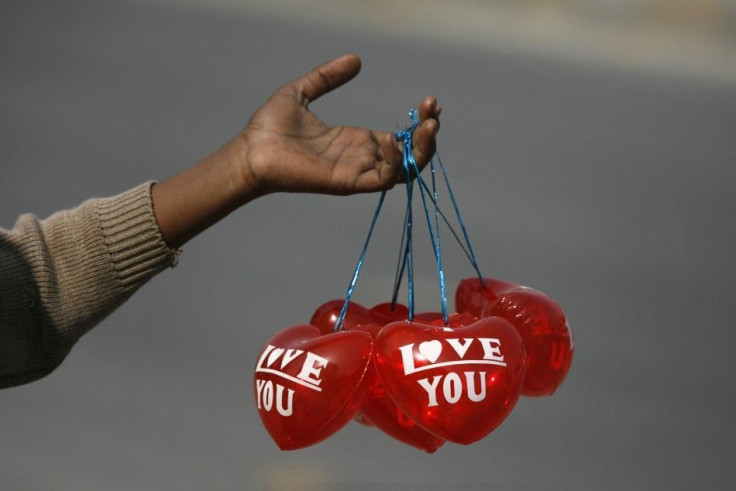Valentine’s Day yet another battleground in East-West culture clash

The so-called ‘culture clash’ between East and West sometimes plays out in the most unexpected ways. But, however it plays out, it remains a “war of values” that the East will ultimately lose.
A few days ago, an Indonesian court sentenced one of that country’s leading pop stars to a prison term for creating and allegedly distributing sex videos on the internet. In the U.S., such an act guarantees a celebrity increased notoriety (fame/money) and talk-show appearances. In Indonesia (and most countries of South Asia and the Middle East), such flaunting of “immorality” leads to something far, far worse.
With Valentine’s Day coming up in a few weeks, we may witness more battles in the endless and epic battle between Western values and Eastern resistance.
Right-wing religious elements in India, Pakistan and Iran, among other nations, have campaigned vociferously against Valentine’s Day as a corrupt and insidious Western contrivance that threatens the social order and ancient values of their societies.
The practice of observing Valentine’s Day (which no longer has any religious relevance in the West since The Vatican removed that Christian martyr’s celebration from the calendar of Catholic saints in 1969) is widely considered a quaint, if somewhat tacky, convention in Europe and the U.S.
But to die-hard conservatives in the East, it represents a dangerous, decadent and “polluting” Western influence.
Thus, it’s part of a much broader issue – the conventions of the wealthy West are increasingly popular among the youth and affluent in countries like India.
Rock-and-roll, alcohol, casual sex, pornography, tabloid media, homosexuality, etc. (i.e., aspects of western society taken for granted in London and New York) are becoming more accepted among the millions of upwardly mobile people in Asia and the Middle East.
Plus, with the advent of the internet (which provides images and discussion of every imaginable human endeavor, from the sublime to the depraved) further tears down the walls between East and West.
Valentine’s Day has become hugely popular in India, Japan, China and even in mullah-ruled Iran. Middle- and upper-class secular citizens of these countries view it as a harmless and charming diversion between married (or unmarried) couples.
However, to members of the old guard who wish to preserve ancient culture, the cards, flowers and chocolates associated with the holiday are nothing less than a call to arms.
In fact, Iranian authorities have warned that “printing and producing any products related to Valentine’s Day, including posters, brochures, advertising cards, boxes with the symbols of hearts, half-hearts, red roses and any activities promoting this day are banned. Authorities will take legal action against those who ignore the ban.”
Iranian authorities have shut down stores selling the cards.
In India, a huge new urbanized (i.e., Westernized) affluent class are going to nightclubs, drinking wine and champagne, playing golf, and exchanging Valentine’s Day cards.
But the backlash against this trend been swift – right-wing Hindu and Muslim militants have not only assaulted people patronizing singles bars, but also people innocently buying Valentines cards, as well as the shopkeepers selling them.
The Shiv Sena party is at the forefront of this anti-Valentines hysteria in India.
Bal Thackeray, who heads Shiv Sena, has said this shameless festival has been celebrated by our young people for the last ten years, but it is totally contrary to Indian culture. We should focus on good work, good thoughts, love and harmony in our society, and not let such Western culture spoil us.”
Members of other extremist groups Vishwa Hindu Parishad, Hindu Bajrang Dal and Hindu Jagran Manch have also declared war on this “corrupting” Western influence.
[Valentine's Day] is nothing but a Western onslaught on India's culture to attract youth for commercial purposes, said Uddhav Thackeray, son of party leader Bal Thackeray.
Hindu and Muslim hard-liners in places like India, Pakistan and Iran see Valentine’s Day as only part of a much larger malaise and conspiracy – the erosion of long-held values by the incursion of Western practices. At the core of this subject is the role of women in society and their sexual behavior, which forms a crucial component of their concepts of “honor” and “cultural purity,”
Ironically, the ancient texts of India (which the contemporary cultural conservatives seek to “preserve”) are replete with lurid, graphic tales and descriptions of sexual activity – for example, the Kama Sutra, the explicit guide of lovemaking; and the sculptures of naked lovers on the temple walls at Khajuraho.
Yet another irony (at least in India) is that the issue of the importation of “corrupt” Western values has united certain Hindus and Muslims – who normally would be at each other’s throats. Indeed, many right-wing Hindus actually advocate the ultimate deportation of Muslims from India.
However, they are fighting a losing battle. India is (more or less) a democracy where ideas are freely exchanged. Unless a Hindu (or Muslim) theocracy is established there, practices like Valentine’s Day and myriad other “foreign” activities will inexorably find more popularity – a result of economic globalization.
© Copyright IBTimes 2024. All rights reserved.




















